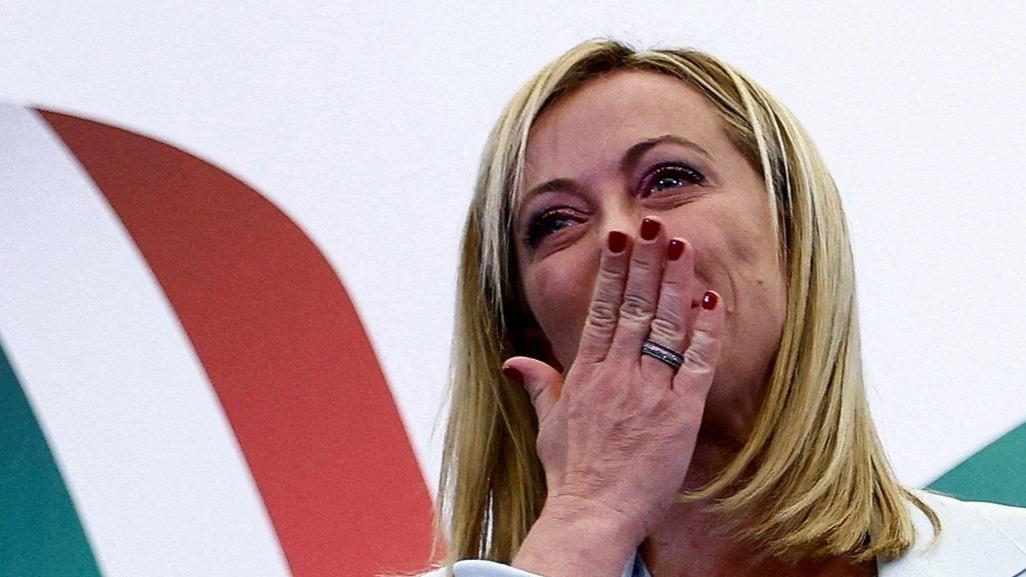A graduate in history and international relations, Max-Erwann Gastineau analyzes the ideological balance of power within Europe. Essayist, he published
Le Nouveau Procès de l'Est
(Editions du Cerf, 2019).
The victory of the right-wing coalition led by Giorgia Meloni worries Europe as much as it expresses concern.
Concern about the future of the Nation, taken both as a cultural community, endowed with its own historical personality, and as a political framework, theater of popular sovereignty.
Meloni hammered home this during his campaign: it is a question of defending the
"national interest"
, in a Europe dominated by the Franco-German duo, and
"national identity"
, in the face of
"migratory peril"
and the surrender because of Christian values.
But Meloni's success is also indicative of a failure, that of the "classic" right to carry the national question.
At the turn of the 2010s, the three main right-wing heads of state of the European Union, Nicolas Sarkozy, Angela Merkel and David Cameron had nevertheless joined the words.
In turn, they denounced
"the failure of multiculturalism"
in terms that Giorgia Meloni would not deny.
"We feel linked to Christian values
," summed up Angela Merkel
.
Anyone who does not accept this has no place here”
(
sic
).
David Cameron was aiming for the integration of
“young Muslims”
: “
For years, we have encouraged different cultures to live apart.
The approach was that integration was not something to be promoted.
It turned out to be wrong.”
Nicolas Sarkozy, faced with
the “explosion
” of
“our immigration system”
, for his part recalled the conditions of living together:
“if you come to France, you agree to blend into a single community.
(…) The national community does not want to change its way of life”.
Ten years after these remarks, the observation is essential: the question of immigration and its consequences on the cohesion of nations has not been the subject of appropriate answers.
The misdeeds of the "classic" right have fueled despair.
The taboos of the left have exacerbated it.
Sweden is undoubtedly the most symptomatic illustration of this, having swapped its model of assimilation in the 1970s for an openly multicultural model.
In Italy, in Sweden, in Spain, in Hungary, in Poland, in the United Kingdom… Everywhere, it is indeed the attachment to the nation which asserts itself and transcends the electorates of the right and the extreme right.
Max-Erwann Gastineau
In
Who are we?
National Identity and Clash of Cultures
, Samuel Huntington paints a portrait of an America shaken up in its identity by Mexican immigration and the affirmation of infra and post-national loyalties, valuing racial belonging, sexual orientation, country origin, the planet… In response, Donald Trump put the nation back at the center of the debate.
"Make America great again"
was the expression of a fundamental movement that the peoples of Europe are expressing in turn, shifting the center of gravity from the right.
In May 2021, the Pew Research Center, an international reference institute for public opinion, published a study highlighting the differences between left, right and center voters.
Eleven questions were asked of samples representing Spanish, German, French, English and American voters.
Eleven questions on national pride, the importance of promoting one's language and traditions, of preserving one's way of life... Eleven questions whose answers revealed the much greater importance accorded by the right-wing voter to national sentiment and national identity.
The case of Isabel Diaz Ayuso, leader of the Madrid region, illustrates this observation.
By adopting a tone à la Meloni, attacking the left on the cultural terrain, and a background promoting the unity of Spain and its traditions (bullfighting, Andalusian cuisine, Catholicism, etc.), Ayuso won a victory history in the last regional elections, doubling the score of his party, the
Partido popular
(44%, 65 seats out of 136), when he represented the outgoing executive.
Coming from the center-right, Ayuso now governs with Vox, a party close to Meloni's movement, Fratelli d'Italia, which has experienced a meteoric rise in a few years;
first in a region historically anchored on the left, Andalusia, against a background of increasing illegal immigration, then on a national scale, against a background of fear for the integrity of the country.
“Espana exists!
“, brandished its activists during the Catalan crisis.
In Italy, in Sweden, in Spain, in Hungary, in Poland, in the United Kingdom… Everywhere, it is indeed the attachment to the nation which asserts itself and transcends the electorates of the right and of the extreme right, forming the terms of a “national conservatism” notably theorized by Yoram Hazony, author of
Virtues of Nationalism
;
book in which the Israeli philosopher designates
"liberal imperialism"
(sic) as the main adversary of the Western peoples.
Meloni's nationalism does not mark the return of the 1930s. It illustrates the foresight of Philippe Séguin, who in his grand speech opposing the Maastricht Treaty warned against the advent of a Europe made up of proscribed nations.
Max-Erwann Gastineau
In response to the conclusions of a survey conducted by the Institut Montaigne on the causes of the "populist wave", the former French ambassador, Michel Duclos, called on the liberal parties to give more space to "
national feelings
" and to “
conservative values
”.
Values whose historical vocation, to embody the need for rootedness, the attachment to "traditional" institutions such as the Church or the family, has for too long been demonized, favoring in reaction the emergence of uninhibited personalities, giving substance and voice to the injustice felt.
The European Union bears a heavy responsibility here.
Meloni's nationalism does not mark the return of the 1930s. It illustrates the foresight of Philippe Séguin, who in his great speech of opposition to the Treaty of Maastricht warned against the advent of a Europe made up of proscribed nations:
“ the quest for identity is not self-affirmation.
It is the defensive reflex of those who feel they have already given up too much”.
When the new European Commission decided in 2019 to create a commission dedicated to
“the protection of the European way of life”
, some believed that the European Union was finally going to respond to the “cultural insecurity” of its peoples.
It did not happen.
The Union does not protect the European way of life, it aspires to conform it to the new canons of the
"liberal-libertarian consensus"
(expression of the Lithuanian Foreign Minister, Gabrielius Landsbergis) which dominates its authorities, plebiscites "minority" aspirations and calls for deconstructing “majority” references.
Let us think of the European Commission, which invites us to no longer use the words "Christmas" and the first name "Marie" in its communications, which are not sufficiently
"inclusive"
(
sic
), and at the same time funds a campaign to promote the
hijab
.
Let us think of the fate of democracy, reduced to a sum of rights that omnipotent jurisdictions are responsible for opposing to States and their sovereign prerogatives.
Heard in the Senate in May 2021, François Bayrou warned against the idea of delegating to third countries the task of ensuring our demographic future.
Max-Erwann Gastineau
The European Parliament is symptomatic of the ever-widening gap between Community institutions and popular aspirations.
In a twenty-page resolution adopted on September 15 to condemn the evolution of Hungary, there are 163 references to “rights”.
163 on twenty pages!
But no reference to the words "duty", "sovereignty" or "national identity".
However, the whole singularity of the new Hungarian constitutional order, to which the constitutional judge is asked to refer in order to defend the "constitutional identity" of the nation, is that it emphasizes both rights and duties ( protect language, spiritual roots, etc.), as much emphasis on individual rights as on
"collective rights"
(
sic
), calling for
“national values”
to be held as fundamental as liberal values.
We also find in this resolution 10 references to LGBT rights, 12 to migrants, including the following:
“Considering that the peaceful coexistence of different ethnic groups has positive effects on the cultural wealth and prosperity of the nation…”
Consideration which, in its simplicity, can be quite agreeable, but is more a profession of faith than historical realism.
Because “co-existence” is never self-evident.
For cultural differences to be overcome, conditions are required.
It takes more than good feelings and tolerance,
"it prevails when all ties have been broken"
, said the philosopher Adam Fergusson.
There needs to be precisely… links, a commonality.
Sweden is seeing it.
In Italy, as elsewhere in Europe, the question of immigration is superimposed on the demographic decline of aging societies.
Italy fell below the fateful threshold of two children per woman in 1977. In 2022, the Italian birth rate is 1.27.
The demographic question concerns all of Europe.
Heard in the Senate in May 2021, François Bayrou warned against the idea of delegating to third countries the task of ensuring our demographic future.
At stake according to him:
“the harmony of a society”
;
"the tensions", the "imbalance"
generated by the lack of control over immigration
"[producing] a drop in the birth rate"
.
It is in the light of its national interests that Germany thinks about “European construction” and hides its geostrategic ambitions less and less.
Max-Erwann Gastineau
Behind the “national-conservative” vote which now unites the right and the extreme right, no one can deny the existence of a certain xenophobia.
But the concern he expresses is much broader.
It is based on a fundamental opposition to the advent of a system devoid of solidarity more substantial than that manifested by taxation or the sharing of socio-political rights.
“The power of nations is based on their social capital – the mutual trust that exists among their members; the fact that they share the same interests and the same values
, summarized D. Goodhart in his article "Is Britain too diverse?".
It is this confidence in a common future that has made possible the construction, over several generations, of cathedrals.
It is also on this mutual trust that our redistributive welfare states are based.
Only the national framework provides the framework in which this essential solidarity can be exercised.
In a chaotic and ultra-competitive world, it's time for nations, not empires.
It is to save their nation that the Ukrainians demonstrate their virtue.
It is in the light of its national interests that Germany thinks about “European construction” and hides its geostrategic ambitions less and less.
As early as the 1990s, Emmanuel Todd announced it: reunification has refocused Germany on its
“national ideal”
.
Outside the West, it is also national interests and the ability of states to defend and project their power that condition international relations.
What
about France in this universe?
The heirs of Gaullism should be the quickest to initiate this inevitable return to the nation.
A return which would not necessarily mean the end of the European Union, but that of a socio-politically marked belief, dreaming of the construction of a transnational political order.
The allegiance of Europeans goes first to their nation.
They do not need to be re-educated, but to give back to their democracy the lost efficiency, and to Europe, the civilizational foundations which it lacks.
SEE ALSO
- Italy, Sweden… Why is Europe tilting to the right?















/cloudfront-eu-central-1.images.arcpublishing.com/prisa/EXJQILQR5QI7OMVRTERD7AEZAU.jpg)